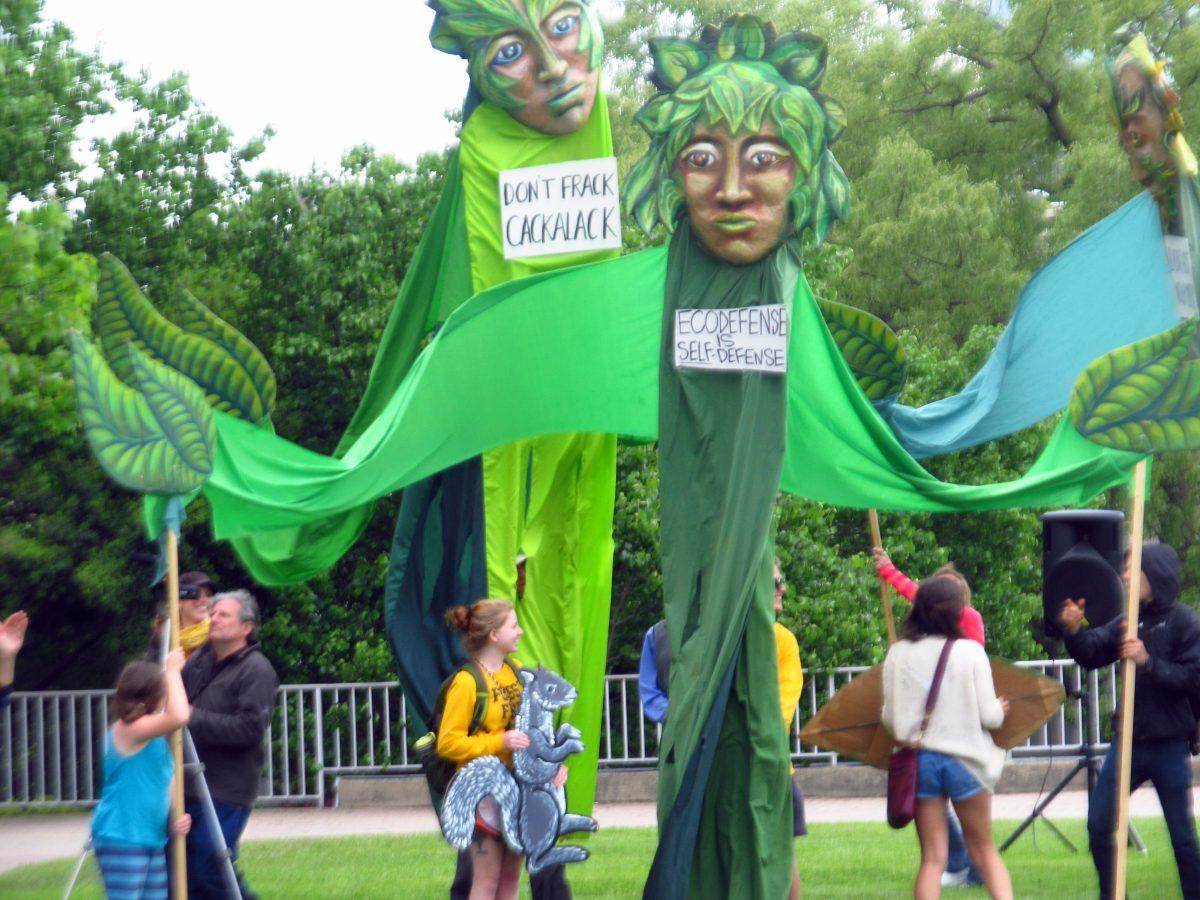“Denial ain’t no river in Africa,” said Bob Bruck, N.C. State professor of plant pathology and forestry, while speaking to a rally at the first annual Climate Convergence on Raleigh.
The event, which took place downtown this Saturday and Sunday, is an independent project affiliated with the international environmental organization 350.org. Taking place the weekend preceding Earth Day — which is today — the purpose of the Convergence was to bring together environmental groups from across the state, discuss common concerns and collaboratively organize for greater effectiveness.
The emphasis among all environmental challenges was on climate change, reducing our dependency on fossil fuels and crossing over to renewable energy in North Carolina. The sessions on Saturday, which took place at the Church of the Good Shepherd and the Museum of Natural Sciences in downtown Raleigh, featured such themes as well as a session each focusing on celebrating the natural world, growing food in an era of climate change and community art.
The more politically-directed of the Convergence’s activities were planned to take place on Sunday, at Halifax Mall, the four acre-large lawn outside the State Legislative Building. A rally, called the Climate Convergence Speak-Out, kicked off at 1:30 p.m. on Sunday afternoon, and featured activists from organizations such as NC WARN, NC Interfaith Power and Light, Greenpeace and 350.org.
A young member of the environmental movement, 10-year-old Hallie Turner of the iMatter Youth Council, also addressed the crowd, saying, “We have only one Earth, a very beautiful Earth, and it is our generation that will inherit this Earth, [our leaders] will have taken care of, or not taken care of.”
Artists such as the singing ensemble known as the Raging Grannies and Carrboro Poet Laureate Jay Bryan also performed at the rally. Besides activists and artists, other environmentalists, from Bob Bruck of N.C. State to fifth-grader Maylin Miller of Boone, also spoke at the rally.
Despite plans to follow up the Speak-Out with action to pressure state legislators, Climate Convergence on Raleigh ended on a soft note. A total of about 150 people were present at the Mall in the afternoon, which was not enough to encircle the Legislative Building, as was the original plan. The crowd couldn’t outnumber the General Assembly, either, which is composed of 170 state legislators. Not even a march was held following the rally, which extended well beyond the time that had been allotted for it.
This statewide Climate Convergence, having been organized for the first time, can be seen as a step in the right direction for environmentalists. However, though it was not yet an established event, this may not be an adequate explanation for the lacking numbers it brought in for substantive political action.
Beginning his address to the crowd with a point about denial, N.C. State professor Bob Bruck stressed the importance of being aware of the gravity of the situation and bringing people into the movement.
“You pay your bills [to Duke Energy and other energy companies], they hire lawyers and lobbyists to fight environmental legislation,” he said to the rally. “[But] global climate change is real. The air you’re breathing has more carbon dioxide than it has had in 2.1 million years. The mean temperature of our planet is warmer than it has been in the last 2.1 million years.”
Bruck said that N.C. State, an engineering school, should be at the forefront of renewable technology advancement, comparing N.C. State’s efforts negatively with those at Appalachian State University. Regarding the participation of environmentally minded University students in the environmental movement, Bruck related student participation to the lacking number of people at the Convergence.
“Get involved. Get involved. It’s a beautiful Sunday afternoon. Where are they?” Bruck asked.
However, even if both the Convergence and the rally could have done better with more participation, the core of activists that was present through the two days and spanned different organizations across the state included a base of student organizers from schools in North Carolina. Representing seven colleges and two high schools, more than 30 organizers met for two student assemblies.
The first took place Saturday evening, in which they discussed the campaigns on their respective campuses and their common vision. Different schools reported varying levels of organization – Appalachian State University and UNC-Chapel Hill, for example, talked about their strong ongoing divestment campaigns to make their university endowments cease supporting fossil fuel companies, while the representative from UNC-Greensboro said the focus on his campus was mainly toward raising awareness.
Ryan Thomson, graduate student in sociology at N.C. State and one of the organizers of Climate Convergence on Raleigh, reported back on the actions of Fossil Free NCSU, which formed this year and also aims to cut the university’s financial ties with Duke Energy.
This particular energy company was identified as the big enemy to environmental progress on campuses, and during the student assembly on Sunday morning, organizers devised of means to team up and take action against Duke Energy. They decided that Tom Ross, President of the UNC System, was already somewhat sympathetic to environmental concerns. But to pressure Duke Energy, they designated Thursday, April 25 as a call-in day for students to tell the company to “consider the true cost of coal,” in Thomson’s words. Duke Energy currently has a wind and solar energy portfolio of 2.7 percent, which students are encouraged to question by calling in on Thursday. Also, it prohibits universities that depend on its energy (i.e., all universities in North Carolina) from investing in third-party vendors of alternative energy sources. The organizers hope that a coordinated blitz of calls to Duke Energy Thursday by students across North Carolina will work as a form of direct action and pressure it to divest from destructive fossil fuels, increase its investment in renewables and permit third-party sales.








